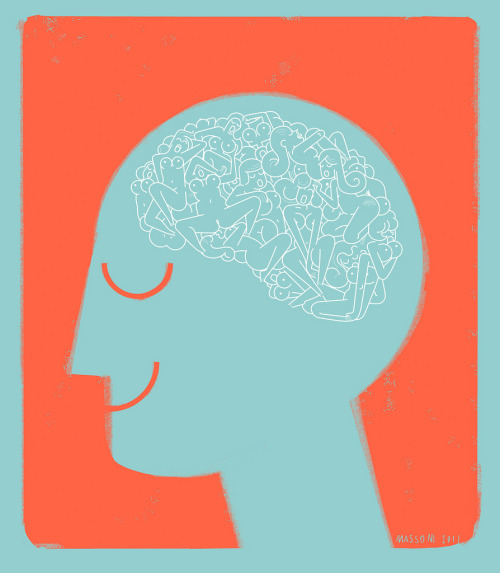
The human mind is full of mysteries. Cognition, the act or process of thinking, enables us to process vast amounts of information quickly. You may be consciously thinking about one particular thing, but you brain is processing thousands of subconscious ideas. Unfortunately, our cognition is not perfect, and there are certain judgments errors that we tend to make, known in the field of psychology as cognitive biases. This situation happens to everybody regardless of age, gender, education, intelligence, or other factors.
Now, I will throw in some information into your ever so lovely smart brain about ten common faults in human thoughts. Starting from number 10, let's do the countdown!
10. Gambler’s Fallacy
The Gambler’s fallacy is the inclination to think that future probabilities are altered by past events, when in reality, they are not. Certain probabilities, such as getting a heads when you flip a (fair) coin, are always the same. The probability of getting a heads is 50%, it doesn’t matter if you’ve gotten tails the last 10 flips. Thinking that the probabilities have changed is a common bias, especially when gambling. This may sound obvious, but this bias has caused many a gambler to lose money thinking the probabilities have changed.
9. Reactivity
Reactivity is the tendency of people to act or appear differently when they know that they are being observed. In the 1920s, Hawthorne Works (a manufacturing facility) commissioned a study to see if different levels of light influenced employees’ productivity. What they found was incredible, changing the light caused productivity to soar! Unfortunately, when the study was finished, productivity levels decreased to their regular levels. This obviously shows that the change in productivity was not due to the light levels, but to the employees being watched. This reveals a form of reactivity; when individuals know they are being watched, they are motivated to change their behaviour, generally to make themselves look better.
8. Pareidolia
Pareidolia is when random images or sounds are perceived as important. Some common examples of pareidolia are seeing clouds in the shapes of dinosaurs, Jesus on a hot pocket, or hearing messages when a record is played backward. The common element is that the stimulus is neutral, it does not have intentional meaning; the meaning is in the viewer’s insight.
7. Self-fulfilling Prophecy
Self-fulfilling prophecy is engaging in behaviours that gain results that confirm existing attitudes. A self-fulfilling prophecy is a prediction that causes itself to become true. For example, I believe that I am going to do poorly in school, so I decrease the effort I put into my assignments and studying, and I end up doing poorly, just as I thought. This is a powerful tool used by “psychics” – they instil an idea in your mind, and you in due course make it happen because you think it will.
6. Halo effect
The Halo effect is the inclination for an individual’s positive or negative trait to “spill over” to other areas of their personality in others’ perceptions of them. This bias happens a lot in employee performance appraisals.
Interesting Fact: The Physical Attractiveness Stereotype is when people assume that attractive individuals possess other socially desirable qualities, such as happiness, success and intelligence. This becomes a self-fulfilling prophecy when attractive people are given privileged treatment such as better job opportunities and higher salaries.
5. Herd Mentality
Herd mentality is the tendency to take on the opinions and follow the behaviours of the popular beliefs to feel safer and to steer clear of conflict. Also known as “Mob Mentality,” this is, at its most familiar form, peer pressure. Herd mentality clarifies why fads get so popular. Things like clothes, cars, hobbies, styles and etc., all it takes is a group of people who think something is cool, and it catches on.
4. Reactance
Reactance is the urge to do the reverse of what someone wants you to do out of a need to defy a perceived attempt to limit your freedom of choice. This is frequent with rebellious teenagers, but any attempt to resist authority due to perceived threats to freedom and/or choice is reactance. The individual may not have a need to do the particular behaviour, however the fact that they cannot do it makes them want to.
Interesting Fact: “reverse psychology” is an attempt to manipulate people using reactance. Tell someone (particularly children) to do the opposite of what you really want, and they will rebel and actually end up doing what you want.
3. Hyperbolic Discounting
Hyperbolic discounting is the tendency for individuals to prefer a smaller, immediate payoff over a larger, delayed payoff. Delay time is a big factor in choosing an alternative. Most people would choose to get 20 dollars today instead of getting 100 dollars one year from today. Normally it makes sense to choose a greater amount of money immediately than less in the future, as the value of a dollar is worth more today than it is tomorrow.
2. Escalation of Commitment
Escalation of commitment is the tendency for people to continue to support previously unsuccessful actions. With all the decisions people have to make, it is unavoidable that some will be unsuccessful. Of course, the logical thing to do in these instances is to change that decision or try to reverse it. However, sometimes individuals feel compelled not only to stick with their decision, but also to further invest in that decision because they have sunk costs.
1. Placebo Effect
The Placebo effect is when an ineffectual substance that is believed to have healing properties produces the desired outcome. Especially common with medications, the placebo effect has been observed when individuals given a sugar pill for a real ailment report improvement. Placebos are still a scientific mystery. It is theorized that placebos cause an “Expectancy Effect”, (In cases of uncertainty, expectation is what is most likely to happen) individuals expect the pills to cure their ailments, so they feel cured. However, this does not explain how the ineffectual pills actually cause a reduction in symptoms.









